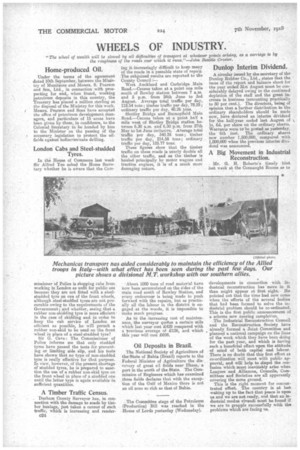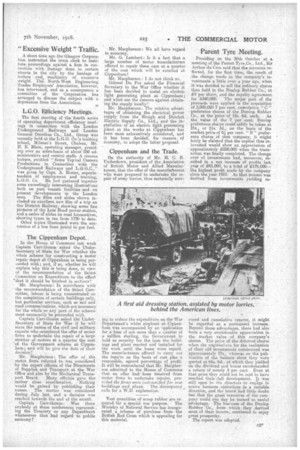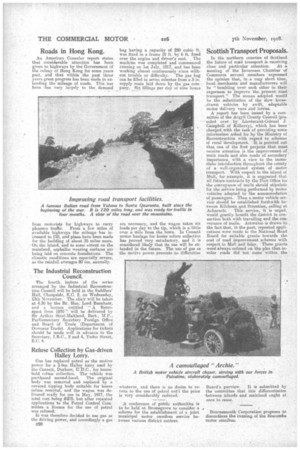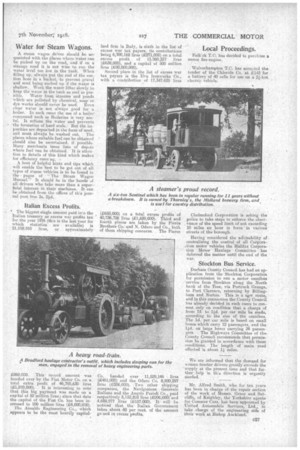WHEELS OF INDUSTRY.
Page 4

Page 5

Page 6

Page 7

If you've noticed an error in this article please click here to report it so we can fix it.
The wheel of wealth will be slowed by all difficulties of transport at whatever points arising, as a carriage is by the roughness of the roads over which it runs."—John Beattie Crozier.
Home-produced Oil.
Under the terms of the agreement dated 10th September, between the Ministry of Munitions and Messrs. S. Pearson and Son, Ltd., in connection with prospecting for and, wheu found, working petroleum deposits in this country, the Treasury has placed a million sterling at the disposal of the Ministry for this work. Messrs. Pearson and Sons have accepted the office of petroleum development managers, and particulars of 15 areas have been given by them, in confidence, to the Colonial Secretary to be handed by him to the Minister on the passing of the necessary legislation to protect the oilfields against indiscriminate drilling.
London Cabs and Steel-studded Tyres.
In the House of Commons last week Sir Alfred Yeo asked the Home Secretary whether he is aware that the Com
missioner of Police is stopping cabs from working in London as unfit for public use because they are not fitted with a steelstudded tyre on one of the front wheels, although steel-studded tyres are not procurable owing to the requirements of the Government ; and whether, seeing that a rubber non-skidding tyre is more efficient in the case of skidding and in order to keep the cab service of London as efficient as possible, he will permit a rubber non-skid to be used on the front wheel in place of a steel-studded tyre? Sir G. Cave: The Commissioner of Police informs me that only studded tyres have passed the tests for preventing or limiting side slip, and his tests have shown that no type of non-studded tyre is really effective for that purpose. In view, however, of the present shortage of studded tyres, he is prepared to sanction the use of a rubber non-skid tyre on the front heel in place of a studded one until the latter type is again available in sufficient quantities.
A Timber Traffic Census.
. Durham County Surveyor has, in connection with the damage to roads by timber haulage, just taken a census of such traffic, which is increasing and render C24
ing it increasingly difficult to keep many of the roads in a passable state of repaiv. The subjoined results are reported to the County Council:—
West Auckland and Corbridge Main Road.—Census taken at, a point one mile south of Rowley station between 7 a.m. and 5 p.m. from 24th June to 3rd August. Average total traffic per day, 118.54 tons; timber traffic per day, 78.28; ordinary traffic per day, 40.26 tons. Shottley Bridge and Burnopfield Main Road.—Census taken at a point half a mile west of Shotley Bridge station between 6.30 a.m. and 6.30 p.m. from 27th May to 1st June inclusive. Average total traffic per day, 340.35 tons; timber traffic per day, 214.58 tons; ordinary traffic per day, 125.77 tons. These figures show that the timber traffic on these roads is nearly double all the other traffic, and as the timber is hauled principally by motor wagons and traction engines, it is of a much more damaging nature.
About 1000 tons of road material have now been accumulated on the sides of the main road south of Rowley Station, and every endeavour is being made to push forward with the repairs, but as practically all the labour in the district is engaged at the woods, it is impossible to make much progress.
As to the increasing cost of maintenance, the surveyor pekes a certain mile which last year cost £429 compared with a previous average of £126, and which this year will cost £698.
Oil Deposits in Brazil.
The National. Society of Agriculture of the-State of Bahia (Brazil) reports to the Federal Minister of Agriculture the discovery of great oil fields near Ilheos, a port in the south of the State. The Commission of Engineers which has examined these fields declares that with the exception of the Gulf of Mexico there is not an oil zone so rich as that of Bahia.
The Committee stage of the Petroleum (Production) Bill was reached in the House of Lords yesterday (Wednesday).
Dunlop Interim Dividend.
A circular issued by the secretary of the Dunlop Rubber Co., Ltd., states that the issue of the report and balance sheet for the year ended llst August must be considerably delayed owing to the continued depletion of the staff and the great, in crease in business (amounting practically to 50 per cent.). The directors, being of opinion that a further distribution to the ordinary shareholders should be made now, have declared an interim dividend for the hall-year ended last August of is. 6d. per share on the ordinary shares. Warrants were to be posted as yesterday, the 6th int. The ordinary shares now number 3,500,000, compared with 1,000,000 when the previous interim dividend was announced.
A Big Movement in Industrial Reconstruction.
Mr. G. H. Roberts's timely hint last week at the Connaught Rooms as to
developments in connection with industrial reconstruction has more in it than might appear at first sight. He pointed out that the time had now come when the efforts of the several bodies that had been formed to solve the industrial problem should be co-ordinated. This is the first public announcement of a scheme now nearing completion. The Industrial Reconstruction Council and the Reconstruction Society have already formed a Joint Committee and planned a national campaign on the lines of the 'work which they have been doing for the past year, and which is having such a beneficial effect upon the attitude of mind of both capital and labour. There is no doubt that this first effort at co-ordination will meet with public approval, and will help to dispel the confusion which must inevitably arise when Leagues and Alliances, Councils, Committees and Societies are all apparently covering the same ground.
This is the right moment for concentrated effort. The country is at last waking up to the fact that peace is upon us and we are not ready, and that an industrial modus vivendi must be found if we are to grapple successfully with the problems which are facing us.
" ExCessive Weight" Traffic.
A short time ago the-Glasgow Corporation instructed the town clerk to institute proceedings against a firm in connection with damage done to certain streets in the city by the haulage of boilers ends machinery of excessive weight. The North-West Engineering Trades Employers' Association, however, has intervened, and as a consequence a committee of the Corporation has arranged to discuss the subject with a deputation from the Association.
L.G.O. Efficiency Meetings.
The first meeting of the fourth series of operating department efficiency meetings in connection with the Teondon Underground Railways and London General Omnibus Co. Ltd., Group was recently held at the L.G.O.Co.'s training school, Milman's Street, Chelsea, MT. H. E. Blain, operating manager, presiding over an attendance of about 250 administrative and control staffs. A cinema lecture entitled "Some Top'eal Camera Productions in Connection with the Underground Railways and L.G.O.C.," was given by Capt. A. Rosier, superintendent of employment and training, L.Ce0. Co. He had gathered together some exceedingly interesting illustrat:ons both on past transit facilities and on present developments in the London area. The films and slides shown included an excellent new film of a trip on the District Railway, showing some fine pictures of the Lots Road power station, and a series of slides on road locomotives, showing types in use from 1770 to date.
Other tepice illustrated were the conversion of a bus from petrol to gas fuel.
The Cippenham Depot.
In the House of Commons last week Captain Carr-Gomm asked the UnderSecretary of State for War whether the whole scheme for constructing a motor repair depot at Cippenham is being proceeded with; and, if so, whether he will explain why this is being done, in view of the recommendation of the Select Committee on Expenditure to the effect *that it should be finished in sections? Mr. Macpherson': In accordance s% ith the recommendation of the Select Committee, labour is being concentrated on the completion of certain buildings only, but particular services, such as rail and road communications, which are necessary for the whole or any part of the scheme must necessarily be proceeded with. Captain Carr-Gomm asked the UnderSecretary of State for War if he will
state the names of the civil and military experts who considered the offer of motor firms to undertake the repair of a large number of motors at a quarter the cost of the Government scheme at Cippenham; and will he give the date of their decision?
Mr. Macpherson: The offer of the motor firms referred to was considered by the expert officers of the Directorate of Supplies and Transport at the War Office and also by the Mechanical Trans port Board. Many officials gave the matter close consideration. Nothing would be gained by publishing their names. The matter was considered during July last, and a decision was reached towards the end of the month.
Captain Carr-Gomm: Was there anybody at these conferences representing the Treasury or any Department whatsoever that had regard to public economy? Mr. Macpherson : We all have regard to economy. Mr. G. Lambert: Is it a fact that a large number of motor manufacturers offered to repair these cars at a quarter of the cost which will be entailed at Cippenham?
Mr. Macpherson : I do not think so. Colonel Du Pre asked the Financial Secretary to the War Office whether it has been decided to instal an electric light generating plant at Cippenham; and vi hat are the reasons against obtaining the supply locally? Mr. Macpherson : The relative advantages of ubtaiiiing the electrical power supply from the Slough and Datchet Electric Supply Co., Ltd. and the installation of an electric light generating plant at the works at Cippenham has been most exhaustively considered, and i,t, has been decided, for reasons of economy, to adopt the latter proposal.
Cippenham and the Trade.
On the authority of Mr. H. C. B. Tinderdown, president of the Association of British Motor and Allied Manniac-' turers, that the offer of the manufa&urers who were prepared to undertake the repair of army lorries, thus materially serv ing to reduce the expenditure on the War Department's white elephant e at Cippenham was accompanied by an opplication for a loan of not more than a euarter of a million sterling, the Government to hold as security for the loan the buildings and plant erected and installed for the work until the loans were repaid. The manufacturers offered to carry out the iepa:rs on the basis of cost pins it reasonable, agreed percentage of profit. It Will be remembered that Mr. Macpherson admitted to the House of Commons that an offer had.. been received from mutor firms ta undertake repairs, provided the firms were indemnified for new blftldsngs and plant: The discrepancy_ calls for a W.D. explanation.
Vast quantities of-scrap rubber are required for a special war purpose. The Ministry of National Service has inaugurated a scheme of purchase from the British Red Cross which is appealing for this material.
Parent Tyre Meeting.
Presiding on the 30th October at a meeting of the Parent Tyre,Co., Ltd., Sir Arthur du Cros said that the accounts reflected, for the first time, the result of the change made in the company's investments a little over a year ago, when it was decided to sell the ordinary shares then held in the Dunlop Rubber Co., at £4 per share, and the royalty agreement for £340,000. The major part of the proceeds were applied in the acquisition of 3,000,000 7 per cent. cumulative " C " preference shares of the Dunlop Rubber Co., at the price of 19s. fid. each. As the value of the 7 per cent. Dunlop preference shams could safely be taken at 21s., or 21s. 3d., on the basis of the market price of 6.1, per cent. " B" preference shares of that company, it might fairly be claimed that the capitol thus reinvested would show an appreciation of approximately £250,000 when the trans. action was finally completed. The change over of investments had, moreover, resulted in a net increase of profits last year of £61,000, to a total of £176,000— the highest profit made by the company since the year 1910. As that income was derived nom investments yielding se cured and cumulative returns, it might be regarded as a permanent increase. Beyond those advantages, there had also been a very considerable appreciation in the market value of this company's shares. The price of the deferred• shares when the negotiations for the realization of their old investments comthenced was approximately 27s., whereas on the publication of the balance sheet they were quoted at (As. 6d. at which they yielded on the dividend and bonus recommended a return of nearly 9 per cent. Even at that price they couldoot be said to have reached their -full development. It was still open to the directors• to engage in active business operations in a suitable direction, and the board had little doubt but that the great resources of the company could one dayv be turned to useful advantage. The business of the Dunlop
• Rubber Co., from which they derived most of their income, continued to enjoy great prosperity. The report was adopted.
Roads in Hong Kong.
An American Consular report states that considerable attention has been given to highways be the Government. of the colony of Hong kong for some years past, and that within the past three years great progress has been made in axtending the mileage of roads. This has been due very largely to the 'demand
from motorists for highways to carry
pleasure traffic. From a few miles of available highways the mileage has increased to 110, and plans have been made for the building of about 35 miles more. -:On the island, and to some extent on the mainland, asphaltic wearing surfaces are being laid on concrete foundations. The climatic conditions are especially Revere, as the rainfall averages 80 ins.. annually.
The Industrial Reconstruction Council.
The fourth lecture of the series arranged by the Industrial Reconstruction Council will be held in the Saddlers'
Cheapside, B.C. 2, on Wednesday, 13th November. The chair will be taken at 4.30 by the Rt. HOP. Lord Burnham, and a lecture entitled ‘" A Retrospect from 1970" will be delivered by Sir Arthur Steel-Maitland, Bart., M. P., Parliamentary Secretary Foreign Office and Board of Trade (Department of Overseas Trade). Applications for tickets -should be made well in advance to the Secretary, I.R.C., 2 and 4, Tudor Street, E.C. 4.
Refuse Collection by Gas-driven Halley. Lorry.
Oafs has replaced petrol as the motive power for a 3-tin Halley lorry used by the Consett, Durham, U.-D.C., for household refuse collection. The vehicle was pueellased second-hand. The original body was removed and replaced by a covered tipping body suitable for house refuse removal, and the wagon was delivered ready for use in May, 1917, the total cost being £275, but after repeated applications to the Petrol Control Committee a licence for the use of petrol was refused.
Ie was therefore decided to use gas as the driving power, and accordingly a gas C26 bag having a capacity of 250 cubic ft. was fixed in a frame 10 ft. by 6 ft. fixed over the engine and driver's seat. The machine was completed and commenced running on let July, 1917, and has been working almost continuously since without trouble or difficulty.The gas bag can be filled in seven minutes from a 3-in. supply main laid down by the gas company. Six fillings per day of nine hours
are necessary, and the wagon takes six loads per day to the tip, which is a little over a mile from the town. In Consett motor haulage for house refuse collection has proved very .satisfactory, and it, is considered likely that its use will be extended in the future. The use of gas as the motive power presents no diffittilties
whatever, and there is no desire to return to the use of petrol until the price is very considerably reduced.
A conference of public authorities is to be held at Bromsgrove to consider a scheme for the establishment of a joint municipal motor omnibus ter-vice between various district centres.
Scottish Transport Proposals.
In the northern counties of Scotland the future of mid transport is receiving close and particular attention. At a meeting of the Inverness Chamber of Commerce several members expressed the opinion that, in a veey short time, local merchants and manufacturers will be tumbling over each other in their eagerness to improve the. present road transport." The means adopted would be the substitution of the slow horsedrawn vehicles by swift, adaptable motor delivery vans and lorries.
A report has been issued by a committee of the Argyll County Council (prosided over by Lieutenant-Colonel J. Campbell of Kilborry), which has been charged/with the task of providing some information asked for by the Ministry of Reconstruction with regard to schemes of rural development. It is pointed out that, one of the first projects that must receive atteution is the improvement of , main roads and also roads of secondary' importance, with a view to the immediate introduction throughout the county of a well-organized system of motor transport. With respect to the island a Mull, for example, it is suggested that all future contracts by the Post Office for the conveyance of mails should stipulate for the service being performed by motor vehicles Adapted to the accommodation of passengers. Then a'rnoter vehicle service should be established forthw Rh between Kilchoan and Strontian, calling at
Aeharacle. This service, it is urged, would greatly benefit the district in connection both with travelling and the conreyance of mails. Attention is drawn to the fact that, in the past, repeated applications were made to the National Road Board for suitable grants towards the cost of road improvement schemes with respect to Mull and Islay. These grants werg.always refused on the plea that insular roads did not come within the Board's purview, It it submitted by the committee that this differentiation -between Wands and mainland ought at once to cease.
Bournemouth Corporation proposes to discontinue the running of the Bascom:be motor omnibus.
Water for Steam Wagons.
A steam wagonshould be ac
quainted with the laces where water can be picked up on the road, and if on a strange road it is not wise to run the water level too low in the tank. When filling up, always put the end of the suction hose in a bucket, to prevent gravel and mud being sucked up If the water is shallow. Work the water lifter slowly to keep the water in the tank as cool as poskibIe. Water from Streams and ponds which are polluted by chemical, soap or dye works should never he used. Even clear water is not always good for a boiler. In such cases the use of a boiler compound such as Boilerine is very useful. It softens the water and prevents the formation of hard scale. But the impurities are deposited in the form of mud, and must always be washed out. The places where suitable fuel can he obtained should also be ascertained, if possible. Many merchants issue lists of depots where fuel can be obtained. It is attention to details of this kind which makes for efficiency runn'ug. A host of helpful hints and tips which will enable the best to be got out of all types of Steam vehicles is to be found in the pages of "The Steam Wagon Manual. ' It should be in the hands „A all drivers who take more than a super-ficial interest in their machines. It can be obtained from the offices of this jour, nal post free 2s. 21d,
Italian Excess Profits.
• The biggest single amount paid into the Italian treasury as excess war profits tax for the year 1916 (this is the last year for which statistics are available) is 21.559.910 liras. or approximately • £860.000. This record amount was handed over by the Fiat Motor Co. on a total extra profit of 46,795,630 Eras (£1,870,000). It is interesting to note that this big payment was made on a capital of 50 million liras; since that date the capital of the Fiat Co. has been increased to 100 million liras (£4,000,000). • The Ansaldo Engineering Co., which • Appears to be the most heavily capital ized firm in Italy, is sixth in the list of excess war tax payers, its contributions being 6,700,168 liras (£Z71,000) on a total excess profit of 15,950,237 Eras (£638,000), and a capital of 500 million liras (220,000,000). Second place in the list of excess war tax payers is the Ilva Ironworks Co., with a contribution of 17,347.625 liras (£693,000) on a total excess profits of 40,736,726 liras (£1,629,000). Third and fourth places are taken by the Pierce Brothers Co. and N. Odero and Co., both of them shipping concerns. The Tierce Co. handed over 11,529,146 liras (£461,000) and the Odero Co. 8,920,297 liras (£356,000). Two other shipping companies, the Navigazione Generale Italiane and the Angelo Parodi Co., paid respectively 5,152,810 bras (£206,000) and _4,689,977 'liras (£187,000). It will be noticed that the Italian Government takes about 40 per cent, of the amount wt.:lied in excess profits.
Local Proceedings.
Fallt:rk T.C. has decided to purchase a motor fire-engine.
Wolverhampton T.C. has accepted the tender of the Chloride Co. at £145 for a battery of 40 cells for use on a 2i-ton electric vehicle.
Chelmsford Corporation is asking the police to take steps to enforce the obser. vance of the speed limit of not exceeding 10 miles an hour in force in various streets of the borough.
Having considered the advisability of centralizing the control of all Corpora..tion motor vehicles the Halifax Corporation Motor Haulage Committee has deferred the matter until the end of the war.
Stockton Bus Service.
Durham County Council has had an application from the Stockton Corporation for permission to run a motor omnibus service from Stockton along the North bank of the Tees, via Portrack Grange. to Port Clarence, returning by Billing ham and Norton. This is a new route, and in this connection the County Council has already decided in such cases to consent only on condigon that a charge of from Id. to lid. per car mile be made. according to the size of the omnibus. The id. -per car mile is based on small buses which carry 12 passengers, and the lid. on large buses carrying 34 passengers. The Highways Committee of the. County Council recommends that permission be granted in accordance with these conditions. The length of main road affected is about J miles.
We are informed that the demand for women tractor drivers greatly exceeds the 'supply at the present time and that further 'help in th's direction is urgently needed.
Mr. Alfred Smith, who for ten years has been in charge of the repair section of the work of Messrs. Grace and Sutcliffe, of Keighley, the Yorkshire agents for Commer Cars, has been appointed by United Automobile Services, Ltd., to take charge of the engineering side of their work, at Bishop Auckland.






















